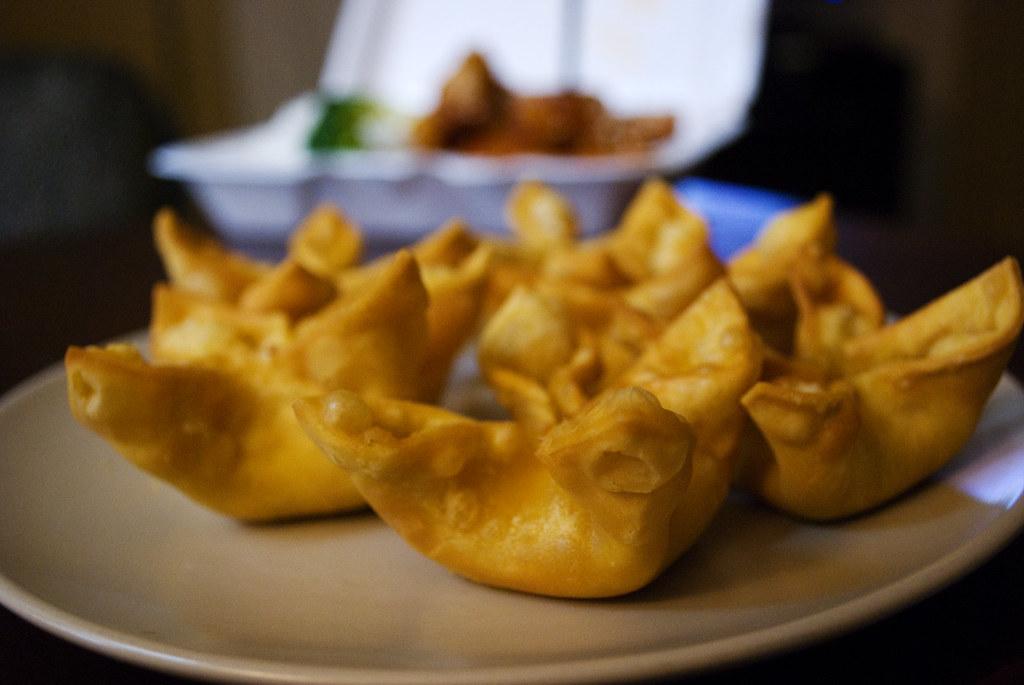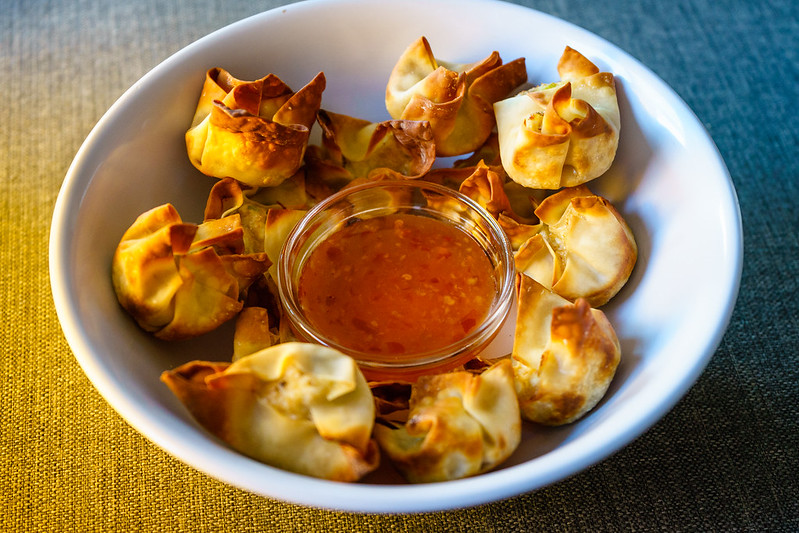Can You Eat Crab Rangoon While Pregnant? | Safety Guidelines
 / Discover more like this here: https://stylevitally.com/can-you-eat-crab-rangoon-while-pregnant/?feed_id=5382&_unique_id=65ad381ebe2d4
/ Discover more like this here: https://stylevitally.com/can-you-eat-crab-rangoon-while-pregnant/?feed_id=5382&_unique_id=65ad381ebe2d4
Introduction
If you're pregnant and craving crab rangoon, you may wonder, 'Can you eat crab rangoon while pregnant?' It's essential to make the best choices for the health of your growing baby, so in this article, we'll explore the safety of indulging in this delicious appetizer during pregnancy. We'll also provide some background information on seafood safety during this critical time.
During pregnancy, it's crucial to be mindful of the foods you eat because some can pose a risk to the health of your developing baby. Seafood, in particular, can be a concern due to the risk of mercury consumption. Mercury is a toxic substance that can harm the nervous system of a developing fetus. However, not all seafood is created equal regarding mercury levels, and some types of seafood are safe to eat in moderation during pregnancy.
What is Crab Rangoon?
Crab Rangoon is a mouth-watering appetizer that's popular in Chinese-American cuisine. This crispy and savory dish consists of a creamy mixture of cream cheese, often with a hint of sweetness, and small bits of imitation crab meat, all folded into a delicate wonton wrapper and deep-fried to golden perfection. When served, it's accompanied by a sweet-and-sour dipping sauce, adding a perfect balance of tanginess to the savory filling. The combination of the crispy exterior and the creamy and slightly sweet filling make Crab Rangoon a delectable treat that's hard to resist.
Can You Eat Crab Rangoon While Pregnant?

Crab rangoon is a popular Chinese-American appetizer consisting of cream cheese and crab filling wrapped in a deep-fried wonton wrapper. While it may be tempting to indulge in this tasty treat during pregnancy, it's essential to consider the safety of each ingredient for both you and your growing baby.
When crab is fully cooked, it is generally safe for pregnant women to consume in moderation. The 2017 recommendations from the U.S. Food and Drug Administration (FDA) and the Environmental Protection Agency (EPA) indicate that cooked crab is one of the best seafood options for pregnant women. These recommendations also emphasize the advantages of diversifying your fish consumption during pregnancy. However, it's crucial to note that consuming raw crab is not advisable, as it elevates the risk of food poisoning, especially for vulnerable populations like older adults, children, and pregnant women.
Regarding crab meat, it's generally safe to eat in moderation during pregnancy. However, it's crucial to choose cooked crab meat rather than raw, as raw crab meat can carry harmful bacteria and parasites that can cause foodborne illness. It's also best to avoid high-mercury seafood such as king mackerel, swordfish, and tilefish, as excessive mercury consumption during pregnancy can harm the baby's developing nervous system.
Cream cheese, a common ingredient in crab rangoon, is made from pasteurized milk and is generally considered safe for pregnant women. However, it's essential to ensure that the cream cheese has been stored correctly and has not expired, as consuming expired dairy products can increase the risk of foodborne illness.
While crab rangoon can be a delicious appetizer, it's important to remember the ingredients and how they're prepared. Opting for cooked crab meat and ensuring that the cream cheese is fresh and properly stored can help minimize the risk of foodborne illness and provide a safe and enjoyable dining experience during pregnancy.
In conclusion, while it may be tempting to indulge in your favorite foods during pregnancy, it's essential to consider the safety of each ingredient and make informed decisions. With a little bit of knowledge and caution, you can enjoy a variety of delicious foods, including crab rangoon, while keeping you and your baby safe and healthy.
Imitation Crab
Imitation crab is another option that can be considered safe during pregnancy. It is cooked and typically poses no harm to pregnant women when consumed. However, it's essential to be cautious about other raw ingredients in dishes containing imitation crab, such as sushi. While imitation crab can mimic the taste of real crab, it lacks the same nutritional value, particularly the omega-3 fatty acids that are highly beneficial during pregnancy. Nonetheless, in terms of calories and protein, imitation crab is similar to authentic crab.
Seafood Safety During Pregnancy
Eating seafood during pregnancy can provide numerous benefits for both the mother and baby. Seafood is a rich source of omega-3 fatty acids, essential for fetal development, including the development of the brain and eyes. However, being aware of the risks of consuming seafood during pregnancy is necessary.
The FDA suggests consuming 2 to 3 servings per week of low-mercury fish, including options like catfish, crab, crawfish, freshwater trout, haddock, lobster, pollock, salmon, scallops, shrimp, and whitefish. Pregnant women can also have one serving per week of fish with slightly higher mercury levels, such as bluefish, carp, Chilean sea bass, mahi-mahi, snapper, tilefish, and tuna (albacore, white, or yellowfin). However, it is essential to ensure that all these seafood choices are thoroughly cooked to minimize the risk of foodborne illness.
One of the main risks of seafood consumption during pregnancy is the potential for mercury contamination(2). Mercury is a toxic substance that can harm the fetus's developing nervous system. Therefore, pregnant women are advised to avoid certain types of seafood known to have high levels of mercury, such as shark, swordfish, king mackerel, and tilefish.
On the other hand, other types of seafood, such as salmon, shrimp, and crab meat, are considered safe to eat in moderation during pregnancy. However, it is essential to properly cook these types of seafood to avoid the risk of foodborne illness.
The Safety of Crab Meat During Pregnancy
Pregnant women may be concerned about crab meat's safety for consumption. The risks associated with eating seafood during pregnancy are primarily due to the potential for mercury contamination and the risk of food poisoning. However, crab meat is generally considered safe for pregnant women to eat in moderation.
Regarding mercury contamination, crab meat contains low levels of this toxin. According to the FDA and EPA, pregnant women can safely consume up to 8-12 ounces of low-mercury seafood per week, including crab meat(1). However, avoiding high-mercury seafood, such as shark, swordfish, king mackerel, and tilefish, is essential, as these can harm fetal development.
The risk of food poisoning is also a concern regarding seafood consumption during pregnancy. Pregnant women should ensure that their crab meat is fully cooked to reduce the risk of bacterial infections. It is also recommended to avoid consuming raw or undercooked seafood and refrigerated smoked seafood, as these may contain harmful bacteria or viruses.
To ensure the safety of crab meat during pregnancy, it is best to purchase it from a reputable source and follow proper cooking and storage guidelines. By doing so, pregnant women can safely enjoy crab rangoon and other seafood dishes as part of a balanced and healthy diet.
Seafood to Avoid
It's essential to avoid consuming seafood that is typically served raw during pregnancy, including sashimi, raw oysters, clams on the half shell, ceviche, poke, tuna tartare, and tuna carpaccio. Pregnant women should also avoid mercury-rich fish, such as mackerel, shark, swordfish, tilefish, marlin, orange roughy, and tuna (big eye).
Risks and Precautions
Consuming raw fish and shellfish can lead to food poisoning due to potential bacterial contamination with Salmonella and Vibrio vulnificus. Symptoms of food poisoning may include vomiting, diarrhea, and stomach pain. In addition to this, it is crucial to take precautions when handling and preparing seafood and crab.
Safe food handling and preparation are vital for crab, fish, or raw meat. Live crabs should be stored in well-ventilated containers, while fresh crabs should be kept in a refrigerator below 40°F or packed in ice, ensuring airtight storage containers. When preparing raw crab, it is essential to use separate cutting boards, plates, and utensils for raw and cooked seafood to prevent cross-contamination.
Moreover, exposure to mercury during pregnancy can be harmful, leading to potential neurological problems and congenital abnormalities. Therefore, avoiding high-mercury fish is paramount to ensure the health and safety of the developing baby.
Conclusion
If you are pregnant and craving crab rangoon, it is recommended that you choose a reputable restaurant that follows proper food handling and preparation guidelines. You can also consider making crab rangoon at home using high-quality ingredients and following safe cooking practices.
Overall, while it is essential to be cautious when consuming seafood during pregnancy, it is possible to enjoy crab rangoon safely and healthily. By following these guidelines and recommendations, pregnant women can satisfy their cravings while ensuring their health, well-being, and growing babies.
Reference
Koren, G., & Bend, J. R. (2010). Fish consumption in pregnancy and fetal risks of methylmercury toxicity. Canadian Family Physician Medecin de Famille Canadien, 56(10), 1001–1002. Retrieved from https://www.ncbi.nlm.nih.gov/pmc/articles/PMC2954077/
Center. (2023). Advice About Eating Fish. Retrieved May 13, 2023, from U.S. Food and Drug Administration website: https://www.fda.gov/food/consumers/advice-about-eating-fish
https://stylevitally.com/can-you-eat-crab-rangoon-while-pregnant/?feed_id=5382&_unique_id=65ad381ebe2d4
Comments
Post a Comment